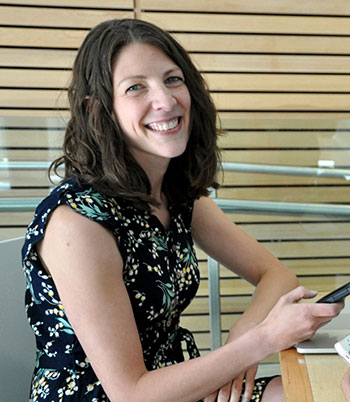
Rebecca Chadney, this year’s Pushor Mitchell LLP Gold Medal Leadership Prize winner.
Winner graduates with double-major in biochemistry and molecular biology and history
For as long as Rebecca Chadney can remember, she has loved both arts and sciences.
When deciding to pursue a career as a physician, she knew her path to medical school would depend on her success as an undergraduate science student — but, she wasn’t ready to let one passion take her away from another.
This week, Chadney graduates with a Bachelor of Science, double-majoring in biochemistry and molecular biology (medical and molecular biology option) and history. She celebrates the end of her undergraduate career as the recipient of the Pushor Mitchell LLP Gold Medal Leadership Prize.
The $10,000 prize, now in its 12th year, is the largest donor-funded award available to graduating Irving K. Barber Faculty of Arts and Social Sciences and Irving K. Barber Faculty of Science students. The award recognizes an individual who has excelled academically and demonstrated leadership while earning their degree.
Andrew Brunton, managing partner at Pushor Mitchell LLP, says the firm is proud to recognize the accomplishments of another exceptional UBC Okanagan student.
“We are thrilled to support Rebecca as she works towards her goal of becoming a physician, and we hope she will be able to continue her great work in the community,” says Brunton.
“We’re proud supporters of UBC Okanagan and are delighted to add Rebecca to the distinguished list of Pushor Mitchell LLP Gold Medal Leadership Prize winners.”
Originally from Langley, BC, Chadney relocated to Kelowna in 2016 to study at UBC Okanagan.
“I knew I wanted to move to a new city, to challenge myself, meet new people, and broaden my world view,” she says. “But, at the same time, I was coming from a small high school in the valley, so I didn’t want to feel like a number or a little fish in a big pond.”
Chadney focused exclusively on science in her first year, but often thought about pursuing a history minor once she was more adjusted to university life.
“I felt a little underprepared at first because although I went to a great high school, it wasn’t STEM-focused, so I didn’t have the lab experience that many of my peers had, and that was a bit stressful,” she explains.
“I was able to push through because I love science. I love learning about the body, and luckily, I was able to get the hang of labs pretty quickly.”
As a science student, Chadney was able to take an arts elective in her second year and registered for a history course with Associate Professor Dr. Jessica Stites-Mor. She was immediately hooked.
“The course was amazing, everything started clicking for me, and it was exactly what I thought university would be like,” recalls Chadney. “Dr. Stites-Mor encouraged me to pursue a minor, but after taking two more classes with her, I was like, okay, I have to double major.”
Chadney continued to study history alongside biochemistry and molecular biology, and ultimately applied for an Undergraduate Research Award with Assistant Professor of History Dr. Tim Paulson in 2020.
“Unfortunately, we didn’t get the award, but Dr. Paulson reached out and asked if I was interested in doing an honour’s thesis with him — and I said yes.”
Chadney’s thesis explored the role of women in Okanagan agriculture from 1890 to 1930.
“I love agriculture, gardening and plants, so it was a really cool opportunity to look at those things in the context of history and women’s studies,” she says.
Aside from her academic pursuits, Chadney is dedicated to community service, serving as president of the UBCO Unicef Club and volunteering for numerous organizations including the Kelowna Gospel Mission Dental Office, a clinic offering dental services to Kelowna’s most vulnerable population.
Chadney also worked as a chemistry teaching assistant, history research assistant, residence advisor, and played intramural sports throughout her time as a student.
Now, she’s looking forward to a well-deserved break before jumping into her next endeavour.
While UBC’s medical program is at the top of Chadney’s list, she’s open to others as long as she’s getting one step closer to her dream career.
Chadney is grateful for the strong support system she’s had over the past five years, including mentor Dr. Paulson and her family. Especially her mother.
“My mom has been there for me through thick and thin — from my very first midterm to my very last final she was always there to encourage me and remind me to aim for progress, not perfection.”
“I want to thank Pushor Mitchell LLP for funding this award — their recognition and generosity gives me the financial freedom to prioritize my education,” she says.
As Chadney reflects on the last five years, she’s most proud of how much she’s grown as a person.
“I came to UBCO feeling really nervous and small, and now I’m leaving with a double-major in my two favourite subjects, a major award and the confidence that I can do anything I put my mind to — and that’s an empowering feeling.”
About UBC’s Okanagan campus
UBC’s Okanagan campus is an innovative hub for research and learning founded in 2005 in partnership with local Indigenous peoples, the Syilx Okanagan Nation, in whose territory the campus resides. As part of UBC—ranked among the world’s top 20 public universities—the Okanagan campus combines a globally recognized UBC education with a tight-knit and entrepreneurial community that welcomes students and faculty from around the world in British Columbia’s stunning Okanagan Valley.
To find out more, visit: ok.ubc.ca


